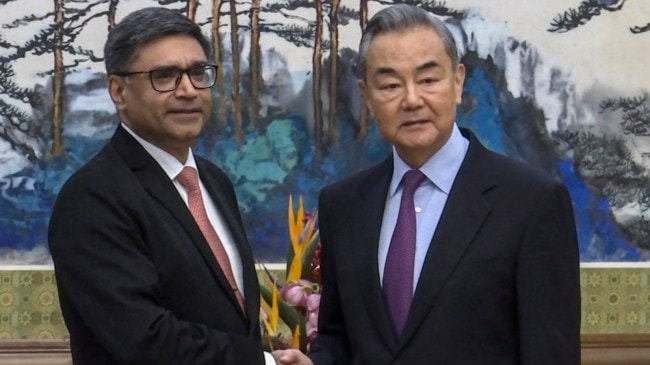Opinion India-China talks: Something achieved, but much more to still do
There are no indications that the two sides are anywhere close to resolving the boundary issue. For the moment, border management is on the agenda, with substantive steps still required to further that goal
 Foreign Secretary Vikram Misri with Chinese Foreign Minister Wang Yi in Beijing. (AP/PTI)
Foreign Secretary Vikram Misri with Chinese Foreign Minister Wang Yi in Beijing. (AP/PTI) Indian Foreign Secretary Vikram Misri’s visit to Beijing marks a step forward in the normalisation of India-China relations. Predictably, the visit yielded some progress with respect to certain low-hanging fruit, or as the MEA termed them, “people-centric steps.” This is a positive sign. India and China need to build a pattern of broad-based, consistent, and substantive engagement if the goal of a stable, predictable and mutually beneficial relationship is to be accomplished. That said, these early outcomes must not obscure the fact that several economic and strategic challenges not only remain unresolved but are also being exacerbated.
The foreign secretary’s visit is the latest in a series of high-level exchanges between the two sides since October 2024. That is when the current process of normalisation began, with the agreement on disengagement and patrolling rights regarding the two friction points of Depsang and Demchok in Eastern Ladakh. The deal enabled a meeting between Indian Prime Minister Narendra Modi and Chinese President Xi Jinping in Kazan, Russia. Since then, there has been greater dialogue, with meetings taking place between the two foreign ministers in Rio de Janeiro and the two Special Representatives (SRs) on the boundary issue in Beijing. The SRs-level meeting was particularly significant, since it essentially revived the mechanism that had been moribund for five years. That said, there are no indications that the two sides are anywhere close to resolving the boundary issue. For the moment, border management is on the agenda, with substantive steps still required to further that goal.
During Misri’s visit, the two sides held delegation-level talks at the vice foreign ministerial level. They issued separate readouts after the talks. There are broadly five points of commonalities that can be identified. First, there is an in-principle agreement to resume direct flights between India and China. This is a good development. Such lack of connectivity between two of the world’s most important economies is unacceptable. Second, both sides agreed to restart the Kailash Mansarovar Yatra this year. Third, there is an agreement to hold a meeting of the India-China Expert Level Mechanism on trans-boundary rivers. Fourth, both sides agreed to facilitate the exchange of journalists, after having taken reciprocal actions to expel them over the past few years. Finally, both sides will hold events and dialogues to commemorate the 75th anniversary of bilateral ties this year.
The devil, however, lies in the details. On the issue of transboundary rivers, there is no clear date for the meeting of the expert-level mechanism. Moreover, the MoUs on hydrological data sharing between the two countries with regard to the Langqen Zangbo/Sutlej and Yarlung Tsangpo/Brahmaputra rivers expired in 2020 and 2023, respectively. It is unclear whether these will be revived as they are or whether there will be fresh negotiations. This becomes significant considering China’s dam-building activity, particularly the proposed mega dam along the Yarlung Tsangpo in Tibet. Likewise, on air connectivity, further talks are required for “an updated framework”, as per the MEA. Rapid and substantive progress on addressing these issues is important to build trust.
There were also important differences in terms of how the two sides characterised the talks. The first point highlighted in the Chinese readout stressed a commitment by the Indian side to support China’s work as the rotating chair of the Shanghai Cooperation Organisation and “actively participate” in events that it hosts. In other words, Beijing expects New Delhi to play ball and Prime Minister Narendra Modi to attend the SCO summit in person later this year. The Indian readout did not refer to this at all. That said, after the talks in Kazan, Misri had said that PM Modi had “assured India’s full support to China’s SCO Presidency next year in 2025.”
On the other hand, while the Indian readout said that “specific concerns in the economic and trade areas were discussed,” the Chinese version of the meeting did not mention these areas. Instead, it said that both sides discussed “their respective concerns in a candid and in-depth manner.” This is significant given Indian concerns around the trade deficit with China and recent coercive steps taken by Beijing to restrict the sale of tunnel boring machines and disrupt the transfer of equipment and manpower for iPhone production in India. The message that such actions send is that China is unwilling to support India’s legitimate right to development.
One assumes that from the Chinese perspective, India’s ties with the US and the Quad would have been one of the primary concerns raised during the talks. After the recent Quad foreign ministers’ meeting in Washington, the Indian side walked away with the impression that the Donald Trump administration wanted to “take the Quad further” and “intensify its activities”. Soon after, the Chinese foreign ministry issued a rather blunt statement, describing the Quad as an example of “group politics and bloc confrontation” that is “not conducive to peace and stability in the Asia-Pacific and the world as a whole.”
Addressing Misri, Foreign Minister Wang Yi indicated that Beijing would like the two sides to “explore more substantive measures,” within the framework of furthering “mutual understanding, mutual support, and mutual achievement, rather than mutual suspicion, mutual estrangement, and mutual consumption.” If this is truly what the Chinese side desires, it is incumbent upon it to demonstrate respect for India’s developmental and strategic interests.
The writer is chairperson of, Indo-Pacific Studies Programme, The Takshashila Institution



